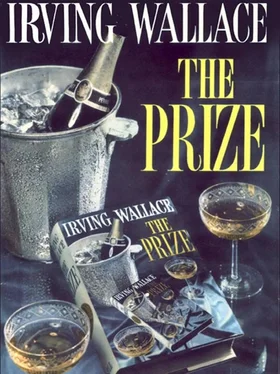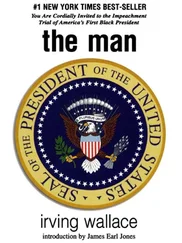Suddenly the self-righteous fury went out of her, and she was less certain. ‘I repeat it-nothing. You can kill me-’
‘Please, Miss Stratman, do not offend me again. I am a scientist and a scholar, not a savage. You are my guest, and I am your host. In the end, you shall see, we will both benefit from this brief meeting. You have someone I want-your uncle-and I have someone you want.’
Eckart had been leaning forward, but now he was erect in the chair, adjusting his monocle to its place. Deliberately, he rose, pulled his short suit jacket straight, and slowly he came around the desk, ignoring Emily as he went to the door through which she had entered.
Emily’s hands tightened on the arms of the chair, and the pulses of her wrists throbbed, as she turned to watch him.
He opened the door to the reception room, and he was nodding to someone out of sight. ‘All right,’ he was saying, ‘she is ready to see you.’
Eckart stepped aside, almost deferentially (how curious), like a chamberlain about to announce the entry of nobility, and at once the figure of an elderly man filled the doorway. The light of the reception room was behind him, and the office was darkened, so that momentarily he was only an outline in black.
Slowly, he shuffled-was there a barely perceptible limp?-into the room, towards Emily, the colourless black of his outline giving way to human features and figure. He came past Emily, and then hesitantly around in front of her, and a few feet before her he halted, as if to inspect her and himself be inspected.
Now, at last, he was clearly visible to her troubled eyes, a stocky old man, slightly bent beneath time, attired in a heavy dark grey unfashionable worsted suit, the suit wrinkled and rumpled as if he had travelled steadily in it and had had no time to send for the valet. She stared without embarrassment, not because he was unusual, but because he was so usual, so almost known and faintly familiar, like one whose face you cannot quite place or whose name is almost at the tip of your tongue.
His head and face held her. The head was massive on a short thick column of neck. The hair was sparse but sufficient, shining white and carefully combed sideways from a wide part above one ear. The face was chapped rough red, all symmetrical and firm despite streaks of age, except for the prominently bulbous nose, which disconcerted her because it was known to her.
Still mystified and curiously detached, Emily could see that the kindly red face-so familiar, so once-known-was alive with emotion, the eyes watery and blinking, the bulbous nose sniffling, the lips trembling.
The familiar stranger swallowed and shook his head. ‘You do not recognize me, my little goose?’
That instant she recognized him, or thought she did, and even as her knotted fists pulled her to the edge of the chair, looking up at him, she rejected the possibility. Yet the bulbous nose, the timbre of his voice, the intangible cord between them that was drawing her out of the chair and unsteadily to her feet, could not be dismissed. Above all, the phrase of endearment this stranger had used so easily, so naturally, as if this was homecoming and they had simply resumed again. My little goose. Where had she heard it before and from whom? Where… back and back and backward the years… when he had carried her round and round the old, oak-lined living-room, on his shoulders, aloft, propping her high, holding her, round and round, faster and faster, as she squealed and kicked, and he laughed and laughed… little goose, little goose… and again, again, leaving her, beribboned, groomed, starched, wide-eyed and pale, at the gymnasium with the frocked teacher… you are growing, a young lady now, my little goose… and once more, with pain, with wrenching… in the drizzle, at the door, down the steps to the street between the efficient, unsentimental brown-shirts… I will write, Rebecca, I will have you out, soon, soon… soon, Rebecca… soon, my little goose…
His caress of love. Only his. No other.
She stood before him now, clamped immobile by a paralysis of disbelief. The massive, venerable face blurred an instant and then an instant stood in bold relief, as if cut from granite and now weather-beaten: the matted white hair, the tear-filled brown eyes, the working stubbled jaw.
Eckart’s brisk voice was behind her, engulfing the incredible seconds and dim years, captioning the moment. ‘Miss Stratman-you must know him, of course-Walther Stratman, your father-’
‘Papa.’ Her voice spoke, not she, to herself, not to the familiar stranger.
‘-missing, but not dead, it turns out,’ Eckart went on behind her. ‘He’s been alive all these years-in custody of the Russians after he helped your uncle escape-working for his captors. But now he is here in neutral Stockholm. It is a miracle I have managed for you-he is free at last.’
The face of the old familiar stranger was nodding, nodding. ‘Yes, Emily, it is Walther-your papa. I know how you feel this minute-as I feel-the shock, the incredibility-but we are alive, my little goose-and together-the darkness gone, forgotten-from now on together, always. I am free, Emily.’
‘Papa,’ her voice said aloud.
And suddenly his rough red face slipped away, sucked slowly into the gaping vortex of the spinning room, and she felt herself moving into the vortex, too. Desperately, she tried to keep her balance, hold on to the something inside, the upright thing you held to keep straight, but she felt it crack beneath her, and she let go and abandoned herself to the airiness of the spinning room. For the eternity of a second, she hung suspended and legless, and then the carpet floated up into vision, and the coarse nap of the carpet was on her cheeks and mouth, and after that, the far voices and enormous shoes, and after that only blackness, star-peppered, and then blackness and blackness…
It was two o’clock in the afternoon.
Seated on the side of the double bed, in the unfamiliar single room on the fifth floor that he had moved into, Andrew Craig dropped the telephone receiver back on the cradle in despair. For an hour and a half, every fifteen or twenty minutes, he had been ringing Emily’s suite without getting a response. If she had been accidentally delayed, why had he not heard from her? The only answer was that she had regretted the message she had sent him, and was purposely avoiding the telephone.
He rose, jittery with frustration, and decided that some activity would calm him down. His valise stood on the baggage table, still not unpacked. He loosened the straps, set the suitcase flat, unlocked it, and began to throw his effects into a cupboard drawer. He passed fifteen minutes in this way, and when the valise was empty, there was nothing more to do. There was, as a matter of fact, his acceptance speech to write, but he had no interest in it.
He filled his pipe, and considered phoning Emily one last time. But it seemed pointless. She knew where he was, or could find out by asking the operator, and if she wanted to see him, she would ring.
Then, as he paced, worrying about Emily, troubled about the speech that must be written, something else occurred to him.
He strode to the telephone and asked to be connected with the portier’s desk in the lobby.
‘Yes? This is the portier .’
‘This is Andrew Craig. Tell me-the keys to the Stratman suite-Miss Emily Stratman-Professor Stratman-are both their keys in the box? I’m trying to find out if either one has returned to the hotel yet.’
‘One second, Mr. Craig.’
Craig waited, holding the receiver to his ear, and then the portier was back on the line. ‘Both keys are missing, so they must both be in. I would-one second, please hold-’ Craig heard indistinct voices, and then the portier again. ‘My colleague behind the desk tells me that Professor Stratman took his key and went up to his suite no more than ten minutes ago. And he says he believes that Miss Stratman came for her key about-it was shortly after the noon hour. So-’
Читать дальше












